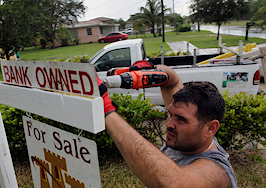New markets require new approaches and tactics. Experts and industry leaders take the stage at Inman Connect New York in January to help navigate the market shift — and prepare for the next one. Meet the moment and join us. Register here.
Casting itself as a victim of “extortion tactics” Carrington Mortgage Services has grudgingly agreed to pay a $5.25 million penalty to settle allegations by federal regulators that it botched the implementation of borrower protections provided to homeowners during the COVID-19 pandemic.
The Consumer Financial Protection Bureau announced the settlement with Carrington Thursday, saying some homeowners who sought forbearance during the pandemic were charged improper late fees, weren’t fully informed of their forbearance and repayment options, and that the company inaccurately reported the forbearance status of borrowers to credit bureaus.

Rohit Chopra
“Carrington Mortgage unlawfully withheld legally mandated pandemic protections, wrongly imposed fees, and reported false information to credit reporting companies,” CFPB Director Rohit Chopra said in a statement announcing the settlement. “Homeowners were misled and denied key protections at a time when they were in most need of help.”
The consent order between the CFPB and Carrington Mortgage Services requires Carrington to conduct an audit to make sure improper late fees are refunded, assess customer service staffing and training and pay a $5.25 million penalty to a victims relief fund.
When companies agree to enter into a consent order to resolve disputes with regulators, they typically deny wrongdoing and it’s rare for them to voice any public complaints about the process. But Carrington Mortgage Services did just that Thursday, issuing a lengthy statement defending the relief it provided to borrowers during the pandemic.
“In trying to help borrowers affected by the COVID-19 pandemic, Carrington acted in good faith and focused on delivering a benefit to consumers,” Carrington Cos. founder and CEO Bruce Rose said in a statement.

Bruce Rose
“I am proud of what our people were able to do for borrowers suffering in the midst of the pandemic,” Rose said, characterizing the CFPB’s enforcement action as “an aggressive and unfortunate example of regulatory overreach.”
“The CFPB’s use of extortion tactics as its primary tool for regulation does nothing to help the industry or consumers,” Rose said. “Ultimately, it is consumers who eventually pay more because of the additional regulatory costs imposed on lending and servicing.”
Rose accused the CFPB of failing to honor a promise to be flexible in enforcing borrower protections adopted in the early days of the pandemic. Many of those protections were spelled out in the Coronavirus Aid, Relief, and Economic Security Act — the CARES Act — a massive $2.2 trillion economic stimulus bill passed by Congress on March 25, 2020, and signed into law by President Donald Trump two days later.
The CARES Act included protections for homeowners with federally backed mortgage loans who were experiencing financial hardship, including requirements that mortgage servicers provide up to 180 days of forbearance to any borrower who requested it.
The CFPB alleged that Carrington Mortgage Services “misrepresented to borrowers that they could not have 180 days of forbearance upon request and that certain borrowers could not have forbearance at all. Carrington also implied that homeowners had to make more detailed attestations than were actually required by law, and the company imposed late fees when they were not permitted.”
Carrington claims that it “worked tirelessly to help borrowers in need, completing more than 134,000 forbearance agreements with its customers, all while taking its own operations remote to protect the safety and well-being of its employees.”
More than 94 percent of borrowers seeking assistance from Carrington successfully resolved their delinquency after forbearance or remain in forbearance because they still need payment relief, the company said.
“The CARES Act required mortgage servicers to implement complex regulatory requirements during the course of a single weekend, which Carrington did successfully, and throughout the early weeks and months of the pandemic when guidance was scarce and at times inconsistent,” Carrington said. “Despite its best efforts, where its execution was not perfect, those issues were corrected by Carrington and, in any event, did not result in consumer harm.”
The CFPB also alleged that Carrington reported some homeowners as delinquent on their mortgages to the big three credit reporting bureaus — Equifax, Experian and TransUnion — even though they were current on their payments when they entered forbearance.
Although Carrington did not directly address the allegation that it provided incorrect information to credit bureaus, it denied having harmed consumers noting that the settlement “does not demand additional consumer remediation, which reflects the lack of consumer harm in this matter.”
Get Inman’s Extra Credit Newsletter delivered right to your inbox. A weekly roundup of all the biggest news in the world of mortgages and closings delivered every Wednesday. Click here to subscribe.













